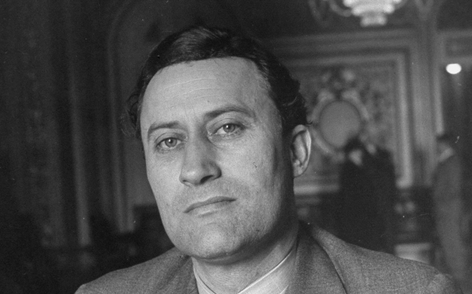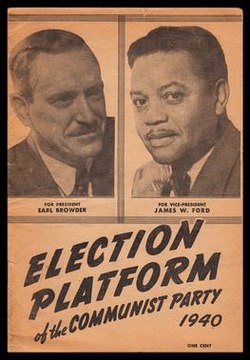Showing posts with label Communist Party USA. Show all posts
Showing posts with label Communist Party USA. Show all posts
Tuesday, August 6, 2019
Glen Hearst Taylor
Glen Hearst Taylor, April 12, 1904 (Portland, Ore.) – April 28, 1984 (Burlingame, Calif.)
VP candidate for Progressive Party (aka New Party aka Independent Progressive Party) (1948)
Running mate with nominee: Henry A. Wallace (1888-1965)
Popular vote: 1,157,328 (2.37%)
Electoral vote: 0/531
The campaign:
Just one of the many sideshows in the crazy 1948 election year included the battle of two FDR Vice-Presidents, Harry Truman (Democrat) and Henry Wallace (now in the newly created Progressive Party), with each claiming they were the true torch-bearer of Roosevelt's legacy.
The Progressive Party's 1948 platform mentions FDR several times in a positive light, linking the late President in what they saw as part of their political lineage:
Ten years ago Franklin Delano Roosevelt warned: "The liberty of a democracy is not safe if the people tolerate the growth of private power to a point where it becomes stronger than their democratic state. That, in its essence, is fascism."
Today that private power has constituted itself an invisible government which pulls the strings of its puppet Republican and Democratic parties. Two sets of candidates compete for votes under the outworn emblems of the old parties. But both represent a single program— a program of monopoly profits through war preparations, lower living standards, and suppression of dissent.
For generations the common man of America has resisted this concentration of economic and political power in the hands of a few. The greatest of America's political leaders have led the people into battle against the money power, the railroads, the trusts, the economic royalists.
We of the Progressive Party are the present-day descendants of these people's movements and fighting leaders. We are the political heirs of Jefferson, Jackson and Lincoln— of Frederick Douglass, Altgeld and Debs— of "Fighting Bob" LaFollette, George Norris, and Franklin Roosevelt.
The platform did have one important difference from the other political parties of the Left in 1948-- they all but embraced Stalin's Soviet regime as they condemned the Cold War. It didn't help that rather than run their own candidate in this election year, the Communist Party USA (now in the hands of the Stalinists) openly endorsed the Progressive Party. The fact that the CPUSA had influence in the Wallace/Taylor campaign is beyond dispute, but to what extent is still a matter of historical debate.
Wallace and Taylor, although not Communist themselves, refused to eschew CPUSA support on the grounds of that they did not wish to participate in the growing hysteria over "Reds" and be on the wrong side of what they called a freedom of speech and thought issue.
Wallace selected US Senator Glen Taylor of Idaho as his running mate. Taylor, a Democrat, was the very first pure Pacific Northwest third party Vice-Presidential candidate, having been born in Portland and raised in Idaho. Until he was elected to the US Senate in 1944, he had never been east of Chicago.
Taylor, who had considerable experience as an actor and musician, possessed a flair for publicity and fully understood how politics is frequently like theater. Known as the "Singing Cowboy" he has been noted for the distinction as one of the most Leftists members of the Senate since the 1930s. He had very mixed feelings about joining the Progressive Party and took several weeks in making his decision to be part of the ticket. In May, 1948 he told a reporter, "I knew I would probably kill my chances of being re-elected [to the Senate] in 1950 if I threw in with Henry. I'm not a lawyer. I've been in show business all my life, living hand to mouth, often in debt. I can't leave the Senate and practice law, like most of these fellows do. It was a tough decision ... I am running because I feel that the question of peace or war is more important than any other consideration."
During the campaign, in May, Taylor was convicted of disorderly conduct in Birmingham, Ala. for using a door reserved for African Americans as he took an action to protest the policy of segregation. Henry Wallace observed, "This dramatizes the hypocrisy of spending billions for arms in the name of defending freedom abroad, while freedom is trampled on here at home."
With votes recorded in 45 states, Wallace/Taylor finished strongest in New York (8.25%), California (4.73%), North Dakota (3.80%), Washington (3.50%), Montana (3.26%), Oregon (2.86%), Nevada (2.36%), and Taylor's Idaho (2.31%). It could be argued that the Progressive Party gave New York and Michigan to Dewey.
Election history:
1938 - Democratic primary for US House of Representatives (Id.) - defeated
1940 - US Senate (Id.) (Democratic) - defeated
1942 - US Senate (Id.) (Democratic) - defeated
1944-1951 - US Senate (Id.) (Democratic)
1950 - Democratic primary for US Senate (Id.) - defeated
1954 - US Senate (Id.) (Democratic) - defeated
1956 - Democratic primary for US Senate (Id.) - defeated
1956 - US Senate (Id.) (Independent write-in) - defeated
Other occupations: actor, country-Western singer known as "The Singing Cowboy," movie theater manager, President of Coryell Construction Co. 1950-1952, inventor and producer of custom toupees called Taylor Toppers (now Taylormade), painter's assistant, sheet metal worker, shipyard worker during WWII, sheepherder, carpenter
Buried: Skylawn Memorial Park (San Mateo, Calif.)
Notes:
Winner of the 1956 US Senate race was Frank Church, a result hotly disputed by Taylor.
Brother of Jazz singer Lee Morse (1897-1954)
12th of 13 children.
Family moved to Kooskia, Idaho when Taylor was very young.
Divorced and remarried.
Died of Alzheimer's Disease.
Lost his hair early in life and invented his own toupee which turned into a successful business still
run by a family member.
In an effort to publicize his need for housing in Washington, DC in 1945, he sang "Oh give us a
home, near the Capitol dome, and a yard where the children can play..." to the tune of "Home on the
Range" on the Capitol steps.
Attempted to organize a Farmer-Labor Party in Montana and Nevada, 1935.
Engaged in a fistfight with Republican Ray McKaig, breaking McKaig's jaw, on Election Day 1946
in Boise.
"Even if it is only a psychological phenomenon, it is a sign of what the world is coming to. If we don't ease the tensions, the whole world will be full of psychological cases and eventually turn into a global nuthouse."--Sen. Taylor on the UFO claims regarding Roswell, NM, July 1947.
He rode his horse, Nugget, up the Capitol steps.
Taylor's brother Paul ran for US Congress in California as a Progressive Party candidate.
Returned to the Democratic Party in 1949.
Tuesday, July 9, 2019
James William Ford
James William Ford, December 22, 1893 (Pratt City, Ala.) – June 21, 1957 (New York, NY)
VP candidate for Communist Party USA (1932, 1936, 1940)
Running mate with nominee (1932): William Z. Foster (1881-1961)
Running mate with nominee (1936, 1940): Earl R. Browder (1891-1973)
Popular vote (1932): 103,307 (0.26%)
Popular vote (1936): 79,315 (0.17%)
Popular vote (1940): 48,557 (0.10%)
Electoral vote (1932, 1936, 1940): 0/531
The campaign (1932):
In an era when thousands of Americans were moving to the Soviet Union, the newly renamed Communist Party USA had their best opportunity to recruit new members.
Pro-Stalinist William Z. Foster was nominated for his third presidential run, with James W. "Jim" Ford as his running mate.
Although Ford is frequently touted as "the first African American to run for a presidential ticket in U.S. history," that is not entirely true although he was the first to be on a ticket where a significant number of votes were recorded from numerous state ballots. But we cannot ignore Frederick Douglass (Equal Rights Party 1872), William Thomas Scott/George Edwin Taylor/William C. Payne (National Negro Liberty Party 1904), and Simon Peter William Drew (Interracial Independent Political Party 1928).
It is true that the CPUSA was one the first political parties to be integrated and denounce segregation, but it was still demographically a very white party.
The 1932 CPUSA platform called for a United States of Soviet America and summarized itself with six points:
1. Unemployment and social insurance at the expense of the state and employers. 2. Against Hoover's wage-cutting policy.
3. Emergency relief for the impoverished farmers without restrictions by the government and banks; exemption of impoverished farmers from taxes, and no forced collection of rents or debts.
4. Equal rights for the Negroes and self-determination for the Black Belt.
5. Against capitalist terror; against all forms of suppression of the political rights of the workers.
6. Against imperialist war; for the defense of the Chinese people and of the Soviet Union.
On Sept. 8 Foster suffered a major heart attack on the campaign trail in Illinois which was followed by a mental breakdown. After the election he went to the USSR to recover, not returning to the US until 1934.
1932 would be the high point for the CPUSA at the presidential ballot box with a final national result of 0.26%, landing in a very distant 4th place. They were an option for voters in 39 states, with their best showing being Montana (0.82%) where in Sheridan County they polled 17.74%.
The campaign (1936):
Earl Browder, a less militant leader of CPUSA than his rival Foster, had stepped into a leadership role after the latter had been sidelined by his failing health. Browder was more willing to work the system and made overtures to the Socialists and other groups to form a united front for pro-labor and anti-fascist activities. Supposedly Browder even offered to be the running mate with Socialist Norman Thomas in 1936.
With votes recorded in 35 states their best showing was in New York (0.64%) and California (0.41%). In some states their popular vote was in single or double digits.
The campaign (1940):
The Nazi-Soviet pact of August, 1939 had seriously undermined the CPUSA's anti-fascist rhetoric and the Party began to lose members, especially artists, writers, and intellectuals who had signed up in the early 1930s. On top of that, presidential nominee Browder had been tried and convicted of passport fraud in 1940, and during the campaign was free while the case was being appealed, which didn't turn out so well for him. He began his 14-month prison sentence in March, 1941.
On the ballot in 23 states, their strongest finish was in California (0.42%).
The CPUSA would not appear on the presidential ballot again until 1968.
Election history:
1930 - US House of Representatives (NY) (Communist Party USA) - defeated
1934 - US House of Representatives (NY) (Communist Party USA) - defeated
Other occupations: blacksmith's helper, machinist's helper, blast furnace laborer, US Signal Corps in France during WWI, mattress factory worker, Post Office worker, author
Buried: cremated
Notes:
First person to run as a third party VP three times.
Attended Fisk University
Joined the Workers (Communist) Party of America in 1926.
In Moscow and Hamburg as an open Communist agent in 1928-1930
In Spain supporting the Republicans in the Spanish Civil War, 1937.
Demoted from his executive position in CPUSA in 1944-1945 due to his association with Earl
Browder, who had been expelled from the Party.
When Ford was young, his grandfather had been burned alive by white mob.
Born James William Foursche "with the accent on the last syllable."
Subscribe to:
Posts (Atom)


























